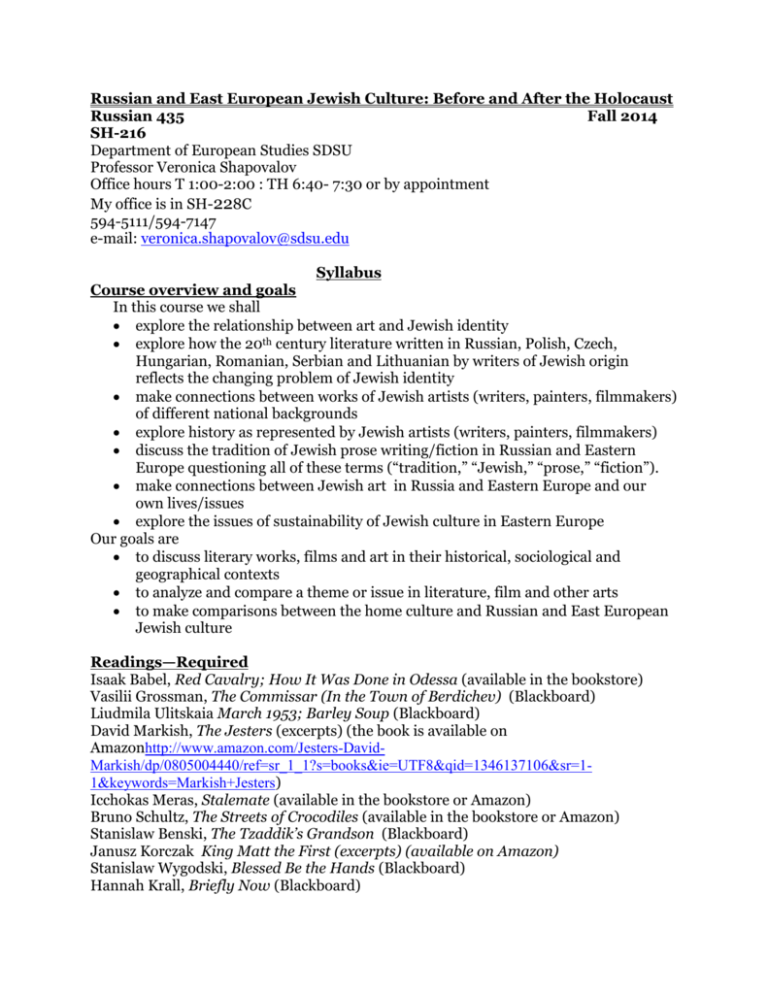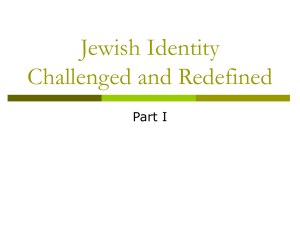View/Open
advertisement

Russian and East European Jewish Culture: Before and After the Holocaust Russian 435 Fall 2014 SH-216 Department of European Studies SDSU Professor Veronica Shapovalov Office hours T 1:00-2:00 : TH 6:40- 7:30 or by appointment My office is in SH-228C 594-5111/594-7147 e-mail: veronica.shapovalov@sdsu.edu Syllabus Course overview and goals In this course we shall explore the relationship between art and Jewish identity explore how the 20th century literature written in Russian, Polish, Czech, Hungarian, Romanian, Serbian and Lithuanian by writers of Jewish origin reflects the changing problem of Jewish identity make connections between works of Jewish artists (writers, painters, filmmakers) of different national backgrounds explore history as represented by Jewish artists (writers, painters, filmmakers) discuss the tradition of Jewish prose writing/fiction in Russian and Eastern Europe questioning all of these terms (“tradition,” “Jewish,” “prose,” “fiction”). make connections between Jewish art in Russia and Eastern Europe and our own lives/issues explore the issues of sustainability of Jewish culture in Eastern Europe Our goals are to discuss literary works, films and art in their historical, sociological and geographical contexts to analyze and compare a theme or issue in literature, film and other arts to make comparisons between the home culture and Russian and East European Jewish culture Readings—Required Isaak Babel, Red Cavalry; How It Was Done in Odessa (available in the bookstore) Vasilii Grossman, The Commissar (In the Town of Berdichev) (Blackboard) Liudmila Ulitskaia March 1953; Barley Soup (Blackboard) David Markish, The Jesters (excerpts) (the book is available on Amazonhttp://www.amazon.com/Jesters-DavidMarkish/dp/0805004440/ref=sr_1_1?s=books&ie=UTF8&qid=1346137106&sr=11&keywords=Markish+Jesters) Icchokas Meras, Stalemate (available in the bookstore or Amazon) Bruno Schultz, The Streets of Crocodiles (available in the bookstore or Amazon) Stanislaw Benski, The Tzaddik’s Grandson (Blackboard) Janusz Korczak King Matt the First (excerpts) (available on Amazon) Stanislaw Wygodski, Blessed Be the Hands (Blackboard) Hannah Krall, Briefly Now (Blackboard) Frantz Kaflka, The Metamorphosis Irzi Weil, Mendelssohn Is On the Roof (available in the bookstore) Karoly Pap, Blood (Backboard) Akos Molnar, Incident on a Trip in 1937 (Blackboard) Danylo Kys, The Tomb for Boris Davidovich (time permitting) George Konrad, Invisible Voice (excerpts) (Blackboard) Structure of the course and grading At each class meeting you are responsible for that day’s reading, for asking good question and answering questions, and leading the discussion when asked to. I hope to keep lecturing to a minimum and 30% of your class grade will be for participation in class discussion. Regular attendance is expected. (More than one absence will lower this part of your grade). Keep a notebook for reading notes and notes you make for preparing for class. The idea behind keeping these notes is to encourage you to formulate questions about the texts, (e.g. what issues do the texts focus on? What strategies do the respective authors use to make their points?) The notebooks will help you to lead the class discussion and participate in the discussion. Two academic papers (4-6 pages each) on assigned topics will be due during the semester. Each will count as 15 % of your grade. (The list of topics will be discussed in class and posted on Blackboard.) You can write on a topic of your choice. If you design your own topic, please discuss your topic with me before you start writing. One in-class presentation on Jewish artists and art —10% (the list of topics will be discussed in class posted on Blackboard) Take-home essay final exam—30%. The exam will be handed out on December 9 and is due to my office BA-310 Thursday, December 16 by 3:00 pm. You are welcome to discuss readings, course content, exams and other academic topics with me. Attendance policy You are allowed one unexcused absence without penalty this semester. Additional unexcused absences will result in lowering your final grade. Policy on reading, homework, and late assignments: All assigned readings should be done prior to the class. Late assignments (homework, papers, and projects) will receive lower grades: one day late = one grade lower, two days late = two grades lower, etc. Exception: pre-approved or approved late submission or lateness in connection with an excused absence. Being overworked, forgetting, having too little time, tests/exams in other classes etc. are NOT reasons that would qualify. All written work must be turned in as a typed hard copy, double-spaced in 10- or 12-point font, and stapled. Please do not e-mail your papers unless you have made arrangements with me before the day it’s due. Academic Integrity College of Arts and Letters expects the highest standards of academic excellence and ethical performance from students. It is particularly important that you are aware of and avoid plagiarism, submitting a paper to more than one instructor, or submitting a paper authored by anyone other than yourself. All incidents of cheating or plagiarism will be reported to the Judicial Procedures Office as required by CSU Policy. Plagiarism: Plagiarism is using others’ ideas and words without clearly acknowledging the source of that information. DO NOT DO IT. Please visit the link http://infotutor.sdsu.edu/plagiarism/word.cfm?p=graphic Tutorial Services page on plagiarism if you have any questions Classroom policy regarding the use of electronic devices: The use of ANY electronic devices during the classroom for note taking or any other purposes is not permitted. If you absolutely have to use your lap-top for note taking— you have to sign the promise NOT to surf the Internet, send messages, do homework, etc. If you break your promise I shall ask you to leave the room and you will get one unexcused absence for this class. Please note All students are welcome to discuss readings, course content, exams, and other academic topics with the instructor. If you are having trouble with an assignment or with a concept, please let me either know during class or e-mail me your question. Questions are always welcome. The course is conducted in English, all the readings are in English. Russian and East European Jewish Culture: Before and After the Holocaust Russian 435 Fall 2014 August 26 Syllabus Introduction. Jews of Russia: the search for identity. From Anatevka to Odessa, Moscow, and St. Petersburg. The road to the revolution. Reading: Babel, Red Cavalry September 2 The historical map of Red Cavalry. Discussion of Red Cavalry Jewish Gangsters and Supermen. Reading: How It Was Done in Odessa. Paustovsky, On Isaak Babel September 9 Discussion of How It Was Done in Odessa. Reading and discussion of In the Town of Berdichev Screening The Commissar Reading: Bruno Schults, The Streets of Crocodiles September 16 Discussion of The Commissar Myth and reality in Bruno Schultz’s world. Discussion of The Streets of Crocodiles Birds and flying people. Fantasy and Symbols: Marc Chagall Screening Marc Chagall Reading: Kafka, The Metamorphosis (The Internet) September 23 September 30 Jewish, German, or Czech? Identity, fantasy and symbols in Kafka’s works. Discussion of Kafka Film clip: The Metamorphosis Reading: Caroly Papp, Blood Akos Molnar, Incident on a Trip in 1937 The end of the world? Approaching the catastrophe. Discussion of Papp and Molnar. Reading: Icchokas Meras, Stalemate October 7 Screening Wajda, Korczak. Reading: Icchokas Meras, Stalemate October 14 Discussion of Stalemate Presentations October 21 Screening A Gift for Stalin Discussion of A Gift for Stalin. Reading: Ulitskaya, March 1953, Barley Soup October 28 First Paper Due Discussion of Ulitskaia. In retrospect: Jews and Peter the Great. Reading: David Markish, The Jesters November 4 Living in Kafkaesque Prague Screening: Divided We Fall Read: : Irzi Weil, Mendelssohn is on the Roof. November 11 Veterans Day ( no class) Read: : Irzi Weil, Mendelssohn is on the Roof. November 18 Discussion of Mendelssohn is On the Roof. Reading: Hanna Krall, Briefly Now; Stanislaw Benski, The Tzaddik’s Grandson, Jan Gross, Jedwabne November 25 Screening Aftermath or Ida Discussion Jewish revival? Post-communist Eastern Europe. Cinema, visual arts, music. December 2 December 9 Second paper due. Note: This schedule is subject to change. All weekly specific assignments will be posted on Blackboard. In this class we shall have three guest lecturers. The dates of their presentations will be finalized by September 6. You are responsible for any changes in the syllabus and assignments that are announced in class, whether you were present or not. .





